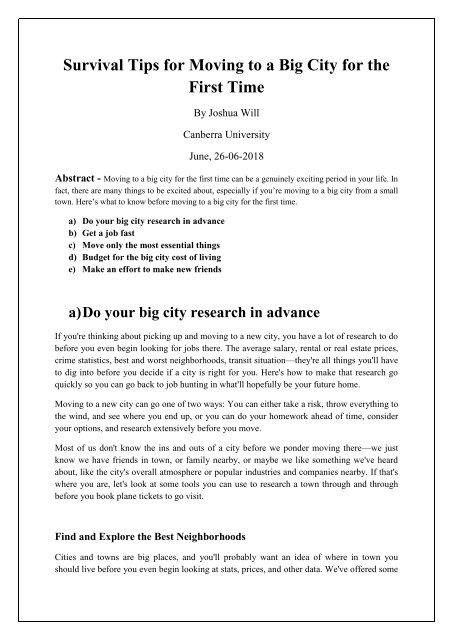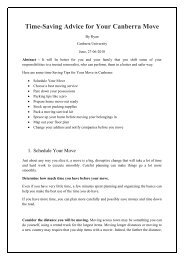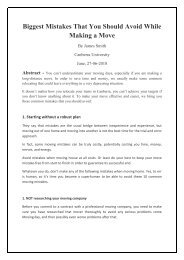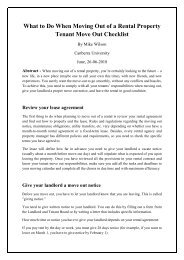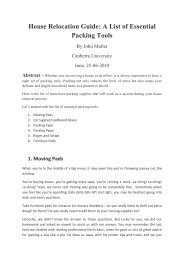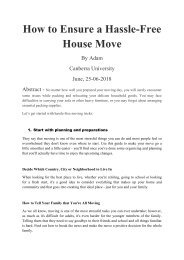survival tips for moving to a big city for the first time
You also want an ePaper? Increase the reach of your titles
YUMPU automatically turns print PDFs into web optimized ePapers that Google loves.
Survival Tips <strong>for</strong> Moving <strong>to</strong> a Big City <strong>for</strong> <strong>the</strong><br />
First Time<br />
By Joshua Will<br />
Canberra University<br />
June, 26-06-2018<br />
Abstract - Moving <strong>to</strong> a <strong>big</strong> <strong>city</strong> <strong>for</strong> <strong>the</strong> <strong>first</strong> <strong>time</strong> can be a genuinely exciting period in your life. In<br />
fact, <strong>the</strong>re are many things <strong>to</strong> be excited about, especially if you’re <strong>moving</strong> <strong>to</strong> a <strong>big</strong> <strong>city</strong> from a small<br />
<strong>to</strong>wn. Here’s what <strong>to</strong> know be<strong>for</strong>e <strong>moving</strong> <strong>to</strong> a <strong>big</strong> <strong>city</strong> <strong>for</strong> <strong>the</strong> <strong>first</strong> <strong>time</strong>.<br />
a) Do your <strong>big</strong> <strong>city</strong> research in advance<br />
b) Get a job fast<br />
c) Move only <strong>the</strong> most essential things<br />
d) Budget <strong>for</strong> <strong>the</strong> <strong>big</strong> <strong>city</strong> cost of living<br />
e) Make an ef<strong>for</strong>t <strong>to</strong> make new friends<br />
a) Do your <strong>big</strong> <strong>city</strong> research in advance<br />
If you're thinking about picking up and <strong>moving</strong> <strong>to</strong> a new <strong>city</strong>, you have a lot of research <strong>to</strong> do<br />
be<strong>for</strong>e you even begin looking <strong>for</strong> jobs <strong>the</strong>re. The average salary, rental or real estate prices,<br />
crime statistics, best and worst neighborhoods, transit situation—<strong>the</strong>y're all things you'll have<br />
<strong>to</strong> dig in<strong>to</strong> be<strong>for</strong>e you decide if a <strong>city</strong> is right <strong>for</strong> you. Here's how <strong>to</strong> make that research go<br />
quickly so you can go back <strong>to</strong> job hunting in what'll hopefully be your future home.<br />
Moving <strong>to</strong> a new <strong>city</strong> can go one of two ways: You can ei<strong>the</strong>r take a risk, throw everything <strong>to</strong><br />
<strong>the</strong> wind, and see where you end up, or you can do your homework ahead of <strong>time</strong>, consider<br />
your options, and research extensively be<strong>for</strong>e you move.<br />
Most of us don't know <strong>the</strong> ins and outs of a <strong>city</strong> be<strong>for</strong>e we ponder <strong>moving</strong> <strong>the</strong>re—we just<br />
know we have friends in <strong>to</strong>wn, or family nearby, or maybe we like something we've heard<br />
about, like <strong>the</strong> <strong>city</strong>'s overall atmosphere or popular industries and companies nearby. If that's<br />
where you are, let's look at some <strong>to</strong>ols you can use <strong>to</strong> research a <strong>to</strong>wn through and through<br />
be<strong>for</strong>e you book plane tickets <strong>to</strong> go visit.<br />
Find and Explore <strong>the</strong> Best Neighborhoods<br />
Cities and <strong>to</strong>wns are <strong>big</strong> places, and you'll probably want an idea of where in <strong>to</strong>wn you<br />
should live be<strong>for</strong>e you even begin looking at stats, prices, and o<strong>the</strong>r data. We've offered some
great <strong>tips</strong> <strong>to</strong> help you pin <strong>the</strong>m down, including visiting sites like StreetAdvisor, which is<br />
entirely dedicated <strong>to</strong> neighborhood reviews and in<strong>for</strong>mation. We'd also suggest checking out<br />
neighborhood details on Foursquare or Yelp, even if you're not specifically looking <strong>for</strong><br />
nightlife or restaurants—both apps have a wealth of in<strong>for</strong>mation entered by locals <strong>for</strong> locals,<br />
and don't be fooled, <strong>the</strong>re are reviews <strong>for</strong> entire neighborhoods at Yelp, and some of <strong>the</strong>m are<br />
both hilarious and useful.<br />
Similarly, City Data offers a wealth of in<strong>for</strong>mation about <strong>the</strong> entire <strong>city</strong>, as well as specific<br />
neighborhoods. The site includes cost of living, average home prices, and even local<br />
attractions or famous destinations in <strong>the</strong> area. Plus, <strong>the</strong>ir <strong>for</strong>ums are an invaluable resource—<br />
a treasure trove of in<strong>for</strong>mation and locals who are willing <strong>to</strong> help you decide where in <strong>to</strong>wn<br />
you'd like <strong>to</strong> move, visit, or just learn more about. Similarly, Neighborhood Scout can help<br />
you learn more about specific neighborhoods once you've pinned down a few you'd like <strong>to</strong><br />
live in. You can start with a bird's eye view of a <strong>city</strong>, and <strong>the</strong>n zoom in on popular<br />
neighborhoods, up-and-coming ones, or test your luck with neighborhoods that are more<br />
af<strong>for</strong>dable but offer a more au<strong>the</strong>ntic and less glossy experience. Whatever you're looking<br />
<strong>for</strong>, both sites will help you find a few neighborhoods you might want <strong>to</strong> look in<strong>to</strong>.<br />
Research Rental/Real Estate Markets and <strong>the</strong> Cost of Living<br />
Once you have an idea where in a <strong>city</strong> you might want <strong>to</strong> live, your next step is <strong>to</strong> see how<br />
much it would cost you <strong>to</strong> actually live <strong>the</strong>re. Some of <strong>the</strong> previous sites will give you<br />
averages, like <strong>the</strong> average home price and average income in <strong>the</strong> vicinity, but <strong>the</strong>re's no<br />
substitute <strong>for</strong> looking at what's on <strong>the</strong> market or available <strong>to</strong> rent right now. Here are a couple<br />
of options:<br />
For home buyers, Trulia, Zillow, and Redfin all offer virtually every real estate listing in a<br />
given <strong>city</strong>. If you've bought a home in <strong>the</strong> past, you're familiar with <strong>the</strong>m, but if not, looking<br />
<strong>for</strong> home prices on <strong>the</strong> market in an area is as simple as typing in <strong>the</strong> zip code or name of <strong>the</strong><br />
area you're interested in. You'll see active listings, <strong>the</strong>ir asking prices, and even get <strong>to</strong> see<br />
pho<strong>to</strong>s of <strong>the</strong> home and <strong>the</strong> surrounding neighborhood. Obviously you're not putting in an<br />
offer just yet, but it's a great way <strong>to</strong> familiarize yourself with <strong>the</strong> real estate market in your<br />
preferred neighborhoods.<br />
For renters, Apartments.com, MyApartmentMap, Padmapper, and HotPads all collect <strong>the</strong> best<br />
of a <strong>city</strong>'s rental listings and make <strong>the</strong>m easy <strong>to</strong> browse. The real estate sites like Trulia and<br />
Zillow also offer rental listings, but go <strong>to</strong> <strong>the</strong> source. These are some of our favorite<br />
apartment search sites <strong>for</strong> good reason. There's always Craigslist <strong>to</strong>o, but many of <strong>the</strong>se sites<br />
pull in Craigslist listings. Still, if you don't see <strong>the</strong>m, Craigslist has finally added maps, so<br />
<strong>the</strong>y're worth checking out. There's also Lovely, which also caters <strong>to</strong> <strong>to</strong>p-down<br />
neighborhood-browsing. In any event, <strong>the</strong> best feature of all of <strong>the</strong>se is that <strong>the</strong>y can help you<br />
figure out which neighborhoods have rentals you can af<strong>for</strong>d and amenities that you'd enjoy<br />
while you live <strong>the</strong>re, and <strong>the</strong>y do it all on a map that you can click and drag around (or drop<br />
down in<strong>to</strong> Google Street View with) easily. Many include in<strong>for</strong>mation on transit options,
walkability data (like how close a rental is <strong>to</strong> transit, shopping, dining, etc), and o<strong>the</strong>rs, like<br />
previously mentioned AutNo, helps you find transit friendly neighborhoods and rentals<br />
directly.<br />
Once you have an idea of how much it'll cost <strong>to</strong> rent or buy a home in a specific<br />
neighborhood, take a street view <strong>to</strong>ur of <strong>the</strong> neighborhood and look around. Check out what<br />
kinds of shops and restaurants are nearby. The more amenities like transit, dining, and retail<br />
are nearby, <strong>the</strong> higher you'll know <strong>the</strong> cost of living will probably be—but all of <strong>the</strong> <strong>to</strong>ols<br />
we've mentioned will help you pin down exact numbers.<br />
Check Out <strong>the</strong> City's Crime Statistics<br />
A Google Street View <strong>to</strong>ur will help you determine whe<strong>the</strong>r a neighborhood looks a little<br />
rough or looks a little <strong>to</strong>o clean <strong>for</strong> your tastes, but <strong>the</strong>re's no replacement <strong>for</strong> real, public<br />
crime data and police blotter aggrega<strong>to</strong>rs <strong>for</strong> <strong>the</strong> areas you're thinking about <strong>moving</strong> <strong>to</strong>.<br />
Crime Reports is a great <strong>first</strong> s<strong>to</strong>p <strong>for</strong> in<strong>for</strong>mation on any <strong>city</strong> in <strong>the</strong> United States, and<br />
Family Watchdog lists convicted sex offenders. SpotCrime is ano<strong>the</strong>r great database of crime<br />
statistics and data, and signing up even gets you regular alerts from a neighborhood or <strong>to</strong>wn<br />
so you get <strong>to</strong> see what's going on <strong>the</strong>re be<strong>for</strong>e you even visit.<br />
Beyond online databases and search <strong>to</strong>ols, you can (and should) reach out <strong>to</strong> <strong>the</strong> local police<br />
department <strong>for</strong> <strong>the</strong> <strong>city</strong> you're thinking about <strong>moving</strong> <strong>to</strong> and ask <strong>the</strong>m <strong>for</strong> a crime report. You<br />
may have <strong>to</strong> find <strong>the</strong> precinct or district that covers <strong>the</strong> neighborhood you want <strong>to</strong> move <strong>to</strong>, or<br />
you may have <strong>to</strong> give <strong>the</strong> department a specific address <strong>to</strong> get a report of all activity within a<br />
given radius of that location, but it's worth doing. It's <strong>the</strong> only way you'll get completely<br />
accurate in<strong>for</strong>mation, and you'll be able <strong>to</strong> dig through <strong>the</strong> reports yourself and judge with<br />
your own eyes. Some police departments only provide aggregate data, so keep that in mind<br />
when you ask—but almost all of <strong>the</strong>m are willing <strong>to</strong> give you some in<strong>for</strong>mation so you can<br />
make an educated decision about <strong>moving</strong>.<br />
Investigate <strong>the</strong> City's Schools and Educational Data<br />
If you have children or are planning <strong>to</strong> start a family, you'll naturally want <strong>to</strong> find <strong>the</strong><br />
neighborhoods with <strong>the</strong> best schools—or at least with schools that are well regarded but are<br />
still af<strong>for</strong>dable <strong>to</strong> live in. A good <strong>first</strong> s<strong>to</strong>p is GreatSchools, a site that helps you find good<br />
schools in a specific area, or will guide you <strong>to</strong> schools within a certain vicinity. The site is<br />
more than a search engine: You'll find <strong>to</strong>ols that will walk you through defining "good" or<br />
"bad" schools look like, <strong>tips</strong> on how <strong>to</strong> assess a school, and even <strong>tips</strong> <strong>for</strong> navigating tricky<br />
school systems <strong>to</strong> get <strong>the</strong> in<strong>for</strong>mation or help you need.<br />
Similarly, Neighborhood Scout's school district ratings page can help you find <strong>the</strong> best public<br />
schools in any area, complete with aggregate data like test scores, class sizes, and student<br />
achievement. SchoolDigger is ano<strong>the</strong>r resource with free, complete metrics on school
districts and systems around <strong>the</strong> country. Be<strong>for</strong>e you start piling up statistics though, this old<br />
op-ed in <strong>the</strong> Washing<strong>to</strong>n Post, although some of its in<strong>for</strong>mation is specific <strong>to</strong> DC residents, is<br />
worth a read—it'll calm your nerves and help you focus on what's really important when<br />
picking a school system, especially since <strong>the</strong> competitive rush <strong>for</strong> exclusive private and<br />
charter schools can get out of hand in some cities.<br />
Learn about <strong>the</strong> Local Culture<br />
Finally, once you have <strong>the</strong> details you need <strong>to</strong> decide whe<strong>the</strong>r a neighborhood sounds like a<br />
good one, take a step fur<strong>the</strong>r and really dig in<strong>to</strong> <strong>the</strong> local culture, attractions, and atmosphere.<br />
City-Data's <strong>for</strong>ums are perfect <strong>for</strong> this, because you can probably find someone who's local <strong>to</strong><br />
where you'd like <strong>to</strong> live <strong>to</strong> speak with directly. Look at <strong>the</strong> <strong>city</strong> from this perspective: If you<br />
moved <strong>the</strong>re, what would you do <strong>for</strong> fun? The answer doesn't have <strong>to</strong> involve <strong>the</strong> <strong>city</strong>'s<br />
famous destinations or popular locales (although it certainly should—if you're <strong>moving</strong> <strong>to</strong> a<br />
new <strong>city</strong>, we have plenty of <strong>tips</strong> <strong>to</strong> help you get <strong>the</strong> lay of <strong>the</strong> land once you're <strong>the</strong>re), but it<br />
should also involve your own interests and passions. If you're a movie buff, look <strong>for</strong> movie<br />
<strong>the</strong>aters close <strong>to</strong> your preferred neighborhood, and check out which movie <strong>the</strong>aters are <strong>the</strong><br />
most popular and well loved by local movie fans.<br />
Ask yourself what <strong>the</strong> <strong>city</strong> is known <strong>for</strong>, cuisine-wise, and check Foursquare, Yelp, and<br />
Google Local <strong>for</strong> reviews and recommendations. Then think about your favorite foods, and<br />
check out where you can get <strong>the</strong>m near your future home. If you're a <strong>big</strong> fan of Japanese<br />
food, make sure you can find a decent restaurant somewhere nearby. If you find a half dozen<br />
and a couple of ramen shops <strong>to</strong> boot, you're in great shape. Repeat <strong>the</strong> process with your<br />
o<strong>the</strong>r interests, whe<strong>the</strong>r it's live music, nightlife, museums, even local festivals and block<br />
parties. Some neighborhoods even have <strong>the</strong>ir own Facebook pages, Twitter accounts, and<br />
websites designed <strong>to</strong> alert locals <strong>to</strong> events happening in <strong>the</strong>ir backyard. Pretend it's your<br />
backyard <strong>to</strong>o, at least <strong>for</strong> <strong>the</strong> <strong>time</strong> being. Be<strong>for</strong>e long, you'll feel like a local.<br />
b) Get a job fast<br />
When you’ve decided you want <strong>to</strong> move <strong>to</strong> a new <strong>city</strong>, or you’re relocating <strong>for</strong> o<strong>the</strong>r reasons,<br />
it can be a challenge <strong>to</strong> figure out <strong>the</strong> best strategy <strong>for</strong> finding a new position. Should you<br />
move <strong>first</strong>? Or, should you try <strong>to</strong> line up a new job and <strong>the</strong>n relocate? What's <strong>the</strong> best way <strong>to</strong><br />
get hired when you're here and <strong>the</strong> jobs are <strong>the</strong>re?<br />
How <strong>to</strong> Decide When <strong>to</strong> Start a Job Search<br />
There isn’t one answer <strong>to</strong> <strong>the</strong> question of when you should start job hunting if you want or<br />
need <strong>to</strong> move. One of <strong>the</strong> <strong>big</strong>gest fac<strong>to</strong>rs <strong>to</strong> consider is your finances. Can you af<strong>for</strong>d <strong>to</strong> go<br />
without a paycheck, pay <strong>for</strong> health insurance, and cover relocation expenses? If you have
cash reserves, it can be easier <strong>to</strong> move <strong>first</strong>, get settled, and <strong>the</strong>n start a job search. If you<br />
don’t, you will need <strong>to</strong> start looking <strong>for</strong> a job be<strong>for</strong>e you move.<br />
Consider your personal circumstances, as well. Do you have someone in <strong>the</strong> new location you<br />
could borrow a bed or a couch from? If so, you may want <strong>to</strong> consider <strong>moving</strong> <strong>first</strong>, finding a<br />
job second.<br />
Ano<strong>the</strong>r fac<strong>to</strong>r <strong>to</strong> consider is <strong>the</strong> type of job you’re looking <strong>for</strong>. It’s quicker and easier <strong>to</strong> get<br />
hired <strong>for</strong> lower level positions than it is <strong>for</strong> jobs fur<strong>the</strong>r up <strong>the</strong> career ladder. If you’re at a<br />
mid-career or higher level position, it’s going <strong>to</strong> take longer <strong>to</strong> get hired. You should plan<br />
your job hunt accordingly, and be prepared <strong>to</strong> conduct a long-distance job search. Keep in<br />
mind that you may be able <strong>to</strong> negotiate a start date that gives you <strong>the</strong> extra <strong>time</strong> you need <strong>to</strong><br />
move and get settled.<br />
Once you’ve decided when you want <strong>to</strong> start looking <strong>for</strong> a new job, <strong>the</strong> next step is <strong>to</strong> figure<br />
out how <strong>to</strong> get hired. Review <strong>the</strong>se <strong>tips</strong> <strong>for</strong> finding work when you’re relocating <strong>to</strong> get<br />
started.<br />
Top 10 Tips <strong>for</strong> Finding a Job in a New City<br />
1. Give Yourself Plenty of Time<br />
Job searching isn’t always as quick or as easy as you think it’s going <strong>to</strong> be. Even if you’re<br />
going <strong>to</strong> wait <strong>to</strong> start a job search, start organizing it ahead of <strong>time</strong>. Update your resume, start<br />
checking out job listings and companies you’re interested in working <strong>for</strong>, get a list of<br />
references ready <strong>to</strong> use, and have an interview outfit ready <strong>to</strong> wear. Here are 10 easy ways <strong>to</strong><br />
organize your job search.<br />
2. Think Local<br />
When you know <strong>the</strong> <strong>city</strong> where you want <strong>to</strong> work, you can target positions <strong>the</strong>re or within a<br />
radius of that location. Use advanced search options <strong>to</strong> find openings where you want <strong>to</strong><br />
work. In addition <strong>to</strong> using <strong>the</strong> job search engines, check Craigslist frequently - new jobs are<br />
posted on <strong>the</strong> site all <strong>the</strong> <strong>time</strong>.<br />
3. Sign Up <strong>for</strong> Job Alerts<br />
Save yourself a step and sign-up <strong>for</strong> email alerts <strong>to</strong> let you know when new jobs that match<br />
your criteria are listed. You’ll be able <strong>to</strong> set <strong>the</strong>m up directly on company websites <strong>for</strong> major<br />
employers, as well as on job listing sites. You’ll receive an email as soon as a listing is<br />
posted, and you’ll be able <strong>to</strong> get your application in right away.
4. Be Available <strong>to</strong> Interview<br />
It’s important <strong>to</strong> have <strong>the</strong> flexibility <strong>to</strong> be able <strong>to</strong> get <strong>the</strong>re quickly when you’re invited <strong>for</strong> an<br />
out-of-<strong>to</strong>wn interview. Most employers interview and hire on a tight schedule, and <strong>the</strong><br />
company may not be willing <strong>to</strong> wait. If you can’t get <strong>the</strong>re when interviews are scheduled,<br />
you may not be considered <strong>for</strong> <strong>the</strong> job. Unless you’re being actively recruited, be prepared <strong>to</strong><br />
pay your own travel expenses. You may want <strong>to</strong> line up <strong>the</strong> best modes of transportation in<br />
advance, so you’re prepared <strong>to</strong> book travel when you get an email or call.<br />
5. Don’t Count on a Relocation Package<br />
Employer relocation packages can make a move go very smoothly. If you’re offered one as<br />
part of your compensation package, it may cover all <strong>the</strong> expenses <strong>moving</strong> entails. There may<br />
be even some extra cash included <strong>to</strong> help you get out of a lease or make a deposit on new<br />
housing. Whe<strong>the</strong>r you’ll get one, or not, depends on <strong>the</strong> company and <strong>the</strong> job you’re hired<br />
<strong>for</strong>. Here’s what is typically included in relocation packages and when employers offer <strong>the</strong>m.<br />
6. Get a Local Address<br />
A local address on your resume and cover letter can help your application get selected. Some<br />
employers don’t consider out-of-<strong>to</strong>wn candidates because <strong>the</strong> logistics can be complicated.<br />
7. Tap Your Connections<br />
Who do you know in <strong>the</strong> place you’re going? Do you have family, friends, professional or<br />
college connections <strong>the</strong>re? Everyone you know, and everyone <strong>the</strong>y know, may be able <strong>to</strong> help<br />
you job hunt. Put <strong>the</strong> word out, very quietly if you’re still employed, that you’re looking <strong>to</strong><br />
relocate <strong>to</strong> get job leads and o<strong>the</strong>r assistance. Here are some of <strong>the</strong> people who can assist:<br />
<br />
<br />
<br />
<br />
<br />
Facebook Friends<br />
LinkedIn Connections<br />
College Alumni Network Contacts<br />
Networking Connections (attend as many in-person events as you can)<br />
Professional Associations and Contacts<br />
8. Take Your Job With You<br />
Do you love your job? There may be a chance that you can take it with you when you move.<br />
If your employer is thrilled with <strong>the</strong> work you do and would hate <strong>to</strong> lose you, <strong>the</strong>y may be<br />
willing <strong>to</strong> let you work remotely. That’s especially <strong>the</strong> case if you’re available <strong>to</strong> travel back<br />
<strong>to</strong> <strong>the</strong> office <strong>for</strong> meetings. Here’s how <strong>to</strong> ask your boss if you can work remotely.
9. Request a Transfer<br />
It’s obviously not feasible if you work <strong>for</strong> a small organization, but if you work <strong>for</strong> a large<br />
company with offices in your new location, transferring may be an option. You may be able<br />
<strong>to</strong> transfer <strong>to</strong> <strong>the</strong> same or a similar job, or you may be able <strong>to</strong> get a different position with<br />
your current employer. Review <strong>the</strong>se <strong>tips</strong> <strong>for</strong> requesting a transfer and transfer request<br />
examples <strong>to</strong> guide you.<br />
10. Consider a Temp or Seasonal Job<br />
One work option <strong>for</strong> when you can’t wait <strong>to</strong> move is <strong>to</strong> consider working as a temp or taking<br />
a seasonal job until you can line up a permanent position. Depending on <strong>the</strong> <strong>time</strong> of year and<br />
location, <strong>the</strong>re may be plenty of short-term jobs you can do until you get hired full-<strong>time</strong>.<br />
c) Move only <strong>the</strong> most essential things<br />
Moving <strong>to</strong> a new home and trying <strong>to</strong> pack light <strong>for</strong> a few days? Maybe you’re relocating and<br />
hauling your worldly possessions across state lines, or you’re packing two suitcases <strong>for</strong> a<br />
flight be<strong>for</strong>e meeting movers at your new place. Or maybe you’re going <strong>to</strong> be camping out in<br />
your new home <strong>for</strong> a few weeks, doing some fix-ups, be<strong>for</strong>e <strong>the</strong> rest of your stuff catches up<br />
with you.<br />
Whatever <strong>the</strong> reason, how do you know which items are essential during your <strong>first</strong> few nights<br />
and what’s optional? What do you need <strong>to</strong> bring <strong>to</strong> your new home, and what can you leave<br />
behind without kicking yourself <strong>for</strong> it later? It may seem overwhelming <strong>to</strong> distill your entire<br />
household of possessions in<strong>to</strong> a few essential boxes, but it can be done. Here are 30 items you<br />
should definitely bring <strong>for</strong> <strong>the</strong> <strong>first</strong> days in your new home:<br />
1. Keys<br />
Don’t laugh — we <strong>for</strong>get <strong>the</strong> obvious all <strong>the</strong> <strong>time</strong>, and you’ll be in real trouble without <strong>the</strong>se.<br />
2. A basic <strong>first</strong>-aid kit<br />
Moving heavy objects can result in a few nicks and scrapes. Be ready with Band-Aids, a<br />
<strong>the</strong>rmometer, an Ace bandage, some antiseptic wipes, tweezers, and a few ibuprofen.<br />
3. Chargers<br />
For all your essential electronics, such as your phone, lap<strong>to</strong>p, and tablet.<br />
4. A portable alarm clock
Be sure <strong>to</strong> bring one or install an alarm clock app on your phone. Moving is stressful enough<br />
on its own. You don’t want <strong>to</strong> be late <strong>for</strong> work, <strong>to</strong>o!<br />
5. Spare batteries<br />
For everything that’s not rechargeable.<br />
6. Sheets and a pillow<br />
Everyone <strong>for</strong>gets this one!<br />
7. Extra changes of clothing<br />
Include sleepwear and underwear.<br />
8. Toiletries<br />
Moving is dirty work. Remember <strong>to</strong> bring soap, shampoo, <strong>to</strong>othbrush and <strong>to</strong>othpaste,<br />
deodorant, moisturizing cream, plus <strong>to</strong>wels and washcloths <strong>for</strong> cleaning up.<br />
9. Shower curtain<br />
Ano<strong>the</strong>r often-<strong>for</strong>gotten item.<br />
10. Essential paper supplies<br />
Such as <strong>to</strong>ilet paper, paper <strong>to</strong>wels, tissues.<br />
11. Basic cleaning supplies<br />
After <strong>the</strong> dust has settled, you’ll need glass cleaner, multisurface cleaner, dish soap, rags, and<br />
a broom and dustpan.<br />
12. Enough plates, utensils, and cups<br />
And by “enough,” we mean enough <strong>for</strong> one meal <strong>for</strong> each person. You’ve got <strong>to</strong> reward all of<br />
your helpful movers after all.<br />
13. A flashlight or headlamp<br />
Make sure you’ve got new batteries in it (a la Essential No.5) in case of power failure, as well<br />
as candles and matches. (Matches can also come in handy if you have a gas s<strong>to</strong>ve that won’t<br />
light.)<br />
14. Sunblock<br />
You’ll probably be spending a lot of <strong>time</strong> outside <strong>moving</strong> boxes, running errands, or taking<br />
care of o<strong>the</strong>r tasks.<br />
15. Any medicine you take daily<br />
16. Easy-<strong>to</strong>-make meal staples
Move-in day isn’t <strong>the</strong> best <strong>time</strong> <strong>for</strong> a five-course meal. Bring food that doesn’t require much<br />
preparation, like pasta and sauce, cereal and milk, bread and peanut butter, canned soup, etc.<br />
17. Any basic cookware and gadgets<br />
You’ll need <strong>the</strong>se <strong>for</strong> those easy meals. Include a pot and pan, serving spoon, and can opener.<br />
18. Snacks<br />
Fruit, nuts, and granola bars are particular favorites, since <strong>the</strong>y require no refrigeration, no<br />
preparation, and no utensils.<br />
19. Beverages<br />
You’ll want bottled water if you won’t have immediate access <strong>to</strong> a filtration system.<br />
20. Instant coffee or tea bags<br />
If you need that morning caffeine fix … who are we kidding? WHEN you need that morning<br />
caffeine fix.<br />
21. Food and dishes <strong>for</strong> pets<br />
22. Radio <strong>for</strong> entertainment<br />
It’s <strong>time</strong> <strong>to</strong> go old school, particularly if your Wi-Fi won’t yet be set up, which means you<br />
can’t access Pandora or o<strong>the</strong>r Internet-based music stations.<br />
23. A small, portable <strong>to</strong>ol kit<br />
You’d be surprised how much you can do with basics like a hammer, screwdriver, and pliers.<br />
24. A sturdy pair of scissors<br />
For opening any boxes that are on <strong>the</strong>ir way <strong>to</strong> your new home, or packaged supplies you<br />
purchase <strong>for</strong> <strong>the</strong> new home.<br />
25. Important identification cards and records<br />
Know where <strong>to</strong> find your driver’s license, passport, lease (if applicable), etc.<br />
26. Important contact phone numbers<br />
Including your lender, <strong>moving</strong> company, and your financial institutions.<br />
27. Pen and paper<br />
Make a list of all those <strong>to</strong>-dos you’re going <strong>to</strong> think of and all <strong>the</strong> extra stuff you’ll realize<br />
you need <strong>for</strong> <strong>the</strong> new place.<br />
28. Cash/credit cards/checkbook
29. Duct tape<br />
Somehow, this always seems <strong>to</strong> come in handy, even at <strong>the</strong> most unexpected <strong>time</strong>s.<br />
30. A personal treat or two<br />
These will help you feel at home and relieve stress.<br />
Don’t underestimate <strong>the</strong> importance of that last point. If you always end <strong>the</strong> night with a glass<br />
of wine, bring a bottle <strong>to</strong> reward yourself at <strong>the</strong> end of your long <strong>first</strong> day. (Don’t <strong>for</strong>get <strong>the</strong><br />
wine opener and a wineglass.) If you’re an avid reader, bring a book you’ve been dying <strong>to</strong><br />
read <strong>to</strong> help you fall asleep at night. If you feel more refreshed or polished while you’re<br />
wearing makeup, bring a tube of mascara. You’re going <strong>to</strong> be working hard when you <strong>first</strong><br />
move in, so make sure you also allow yourself a bit of fun <strong>to</strong> make <strong>the</strong> transition as easy as<br />
possible.<br />
d) Budget <strong>for</strong> <strong>the</strong> <strong>big</strong> <strong>city</strong> cost of living<br />
Let’s say you have your sights set on a new <strong>city</strong> and you’re ready <strong>to</strong> pack your bags, get out<br />
of dodge, and start a new life in ano<strong>the</strong>r part of <strong>the</strong> country. (Or even <strong>the</strong> world!) Getting out<br />
of dodge is expensive, but it’s easy <strong>to</strong> get a ballpark idea of cost.<br />
Online <strong>to</strong>ols like <strong>the</strong> City <strong>to</strong> City <strong>moving</strong> calcula<strong>to</strong>r can help you break down <strong>the</strong> cost of<br />
<strong>moving</strong> <strong>to</strong> a new <strong>city</strong>, depending on <strong>the</strong> distance and a number of o<strong>the</strong>r fac<strong>to</strong>rs. Enter your<br />
old <strong>city</strong>, your new one, <strong>the</strong>n some details on how you’ll be living, and <strong>the</strong> calcula<strong>to</strong>r will tell<br />
you how much you can expect <strong>to</strong> spend. The <strong>to</strong>ol assumes you’ll drive ra<strong>the</strong>r than fly and use<br />
a service like PODs, which can make <strong>the</strong> move a lot more expensive.<br />
If you’re planning a move overseas, try this International Moving Cost calcula<strong>to</strong>r instead,<br />
which estimates what it will cost you <strong>to</strong> ship your belongings <strong>to</strong> ano<strong>the</strong>r country, whe<strong>the</strong>r it’s<br />
by sea or air.<br />
If you want <strong>to</strong> get a more cus<strong>to</strong>mized idea and do <strong>the</strong> math on your own, here are a few<br />
expenses <strong>to</strong> consider when you’re budgeting <strong>for</strong> a <strong>big</strong> move:<br />
<br />
<br />
<br />
<br />
Transportation: The actual cost of carriage if you use a UHaul or delivery service.<br />
Gasoline: Don’t <strong>for</strong>get <strong>to</strong> fac<strong>to</strong>r in <strong>the</strong> cost of gas <strong>to</strong> haul your stuff from one <strong>city</strong> <strong>to</strong><br />
<strong>the</strong> next, if applicable. If you’re driving yourself, Gas Buddy’s Trip Cost Calcula<strong>to</strong>r<br />
can help you save money by pinning <strong>the</strong> cheapest s<strong>to</strong>ps on your route.<br />
Packing material: Tape, boxes, popcorn — this stuff adds up, so it deserves its own<br />
line item in your budget. (Of course, you can score free <strong>moving</strong> boxes if you look in<br />
<strong>the</strong> right places, <strong>to</strong>o).<br />
The “Summer Premium”: If you’re <strong>moving</strong> between May and September, prices<br />
may be a bit more expensive. The calcula<strong>to</strong>r estimates it’s 20% more expensive <strong>to</strong><br />
move around this <strong>time</strong> of year.
This isn’t exactly related <strong>to</strong> <strong>the</strong> cost of <strong>the</strong> move, but if you’re breaking your lease or you<br />
need <strong>to</strong> put a down payment on your new apartment in your new <strong>city</strong>, it’s helpful <strong>to</strong> fac<strong>to</strong>r<br />
that in as one of your <strong>moving</strong> expenses, <strong>to</strong>o.<br />
Finally, if you want <strong>to</strong> explore how much more expensive your day-<strong>to</strong>-day life will be in your<br />
new <strong>city</strong>, check out a Cost of Living calcula<strong>to</strong>r, like this one from Bank rate. The numbers<br />
will vary depending on your lifestyle, but it’s a good place <strong>to</strong> get started with a general idea<br />
of what you’ll pay.<br />
e) Make an ef<strong>for</strong>t <strong>to</strong> make new friends<br />
1. Reach out <strong>to</strong> friends of friends.<br />
Ask your current friends if <strong>the</strong>y know anyone in your new <strong>city</strong>. Get ahold of <strong>the</strong>ir contact info<br />
and reach out! Most people understand that <strong>big</strong> moves can be daunting and will be willing <strong>to</strong><br />
meet <strong>for</strong> dinner or a drink.<br />
2. Sign up <strong>for</strong> Meetup.<br />
Organize and join local, real-life "meetups" with people who share your interests. Download<br />
it <strong>for</strong> free here.<br />
3. Get a dog and download Meet My Dog.<br />
But, really. Dog parks = new friends. If that's not in <strong>the</strong> cards <strong>for</strong> you, borrow a dog.<br />
4. Go explore.<br />
It can be scary <strong>to</strong> go out on your own in a new <strong>city</strong>, but you're less intimidating when you're<br />
alone. Get a good book and wait <strong>for</strong> people <strong>to</strong> approach you, or go up <strong>to</strong> people yourself<br />
while you're out and about!<br />
5. Make an ef<strong>for</strong>t with co-workers.<br />
Start grabbing lunch with <strong>the</strong>m as much as possible. You'll get closer over <strong>time</strong> and start<br />
being invited <strong>to</strong> stuff outside of work.<br />
6. Look up local teams or running clubs.
Most cities have adult leagues you can sign up <strong>for</strong> and meet like-minded people. If team<br />
sports aren't your thing, think about joining a gym or yoga studio. If you go regularly, you're<br />
likely <strong>to</strong> see familiar faces.<br />
7. Take a continuing education class.<br />
Now is <strong>the</strong> <strong>time</strong> <strong>to</strong> take that French class you've always thought about. Or a cooking class so<br />
you're not *solely* ordering in. You just might meet a new BFF in <strong>the</strong> process!<br />
8. Search events on Nearify.<br />
While not a direct set up <strong>for</strong> meeting people, <strong>the</strong> more events you go <strong>to</strong>, <strong>the</strong> more likely you<br />
are <strong>to</strong> make friends in your new <strong>city</strong>. Download it here.<br />
9. Ask people on friend dates.<br />
Be <strong>for</strong>ward! Say, "I have a friend-crush on you, would you wanna go <strong>for</strong> coffee or something<br />
some<strong>time</strong>?" Mention that you're new <strong>to</strong> <strong>the</strong> <strong>city</strong> and trying <strong>to</strong> explore.<br />
10. Meet new people over food with Supper Club.<br />
Eat, drink, and be merry with future BFFs. Download it here.<br />
11. Take pictures.<br />
If you're <strong>the</strong> one snapping lots of pictures at an event or party, it's super easy <strong>to</strong> get in <strong>to</strong>uch<br />
with people later. Just say: "Are you on Facebook? Or would you want me <strong>to</strong> email you a<br />
copy?" Hello, new contacts.<br />
12. Go <strong>to</strong> cultural events.<br />
It's usually af<strong>for</strong>dable and some<strong>time</strong>s even FREE. Concerts in <strong>the</strong> park, art exhibits, and plays<br />
are just <strong>the</strong> beginning. And you'll au<strong>to</strong>matically have things <strong>to</strong> talk about with <strong>the</strong> people in<br />
attendance.<br />
13. Open up!
Vulnerability plays a huge part in emotional bonds with friends. Especially early on in <strong>the</strong><br />
game, open up about yourself when meeting new people. If you keep things surface value, a<br />
friendship isn't likely <strong>to</strong> grow out of it.<br />
14. If you moved <strong>to</strong> a <strong>big</strong> <strong>city</strong>, check out City Socializer.<br />
It's also a great way <strong>to</strong> discover places you won't find in <strong>the</strong> guidebooks. Read more and sign<br />
up here.<br />
15. Do your best <strong>to</strong> say "YES!"<br />
Most of us enjoy Netflix on <strong>the</strong> couch. However, you're not going <strong>to</strong> meet anyone new from<br />
sitting in your apartment. Accept <strong>the</strong> invites you receive and get out <strong>the</strong>re.<br />
16. Volunteer somewhere you're passionate about.<br />
Make friends while making <strong>the</strong> world a better place? Win, win.<br />
17. Maintain budding friendships.<br />
Going <strong>to</strong> coffee with someone ~once~ is probably not going <strong>to</strong> cement a lifelong friendship.<br />
If you're looking <strong>for</strong> something real, commit! Plan bi-monthly brunch hangouts, or wine<br />
Wednesday get-<strong>to</strong>ge<strong>the</strong>rs <strong>the</strong> <strong>first</strong> of every month.<br />
Conclusion<br />
The truth is that if you do your homework in advance and play your cards right, you have a<br />
great chance of disproving all pessimists who like <strong>to</strong> think that cheap is almost always<br />
synonymous with poor quality.<br />
References<br />
ETHAN GREENFIELD(2018) | 7 <strong>survival</strong> <strong>tips</strong> <strong>for</strong> <strong>moving</strong> <strong>to</strong> a <strong>big</strong> <strong>city</strong> <strong>for</strong> <strong>the</strong> <strong>first</strong> <strong>time</strong> |<br />
Moving Tips. Retieved on 26-06-2018 from<br />
https://<strong>moving</strong>.<strong>tips</strong>/post-move-<strong>tips</strong>/<strong>tips</strong>-<strong>for</strong>-<strong>moving</strong>-<strong>to</strong>-a-<strong>big</strong>-<strong>city</strong>/
Alan Henry(2013) | How <strong>to</strong> Learn All About a New City Without Leaving Your House | Life<br />
Hacker. Retieved on 26-06-2018 from<br />
https://lifehacker.com/how-<strong>to</strong>-learn-all-about-a-new-<strong>city</strong>-without-leaving-your-511561572<br />
ALISON DOYLE(2018) | 10 Tips <strong>for</strong> Finding a Job in a New City | The Balance Careers.<br />
Retieved on 26-06-2018 from<br />
https://www.<strong>the</strong>balancecareers.com/<strong>tips</strong>-<strong>for</strong>-finding-a-job-in-a-new-<strong>city</strong>-4089082<br />
Erin Frye(2015) | 17 Smart Ways To Make New Friends When You Move | Buzz Feed.<br />
Retieved on 26-06-2018 from<br />
https://www.buzzfeed.com/erinfrye/all-new-friends<br />
BetterRemovalistsCanberra(2017) | Benefits of Hiring Professional Furniture Removalists |<br />
Better Removalists Canberra. Retieved on 26-06-2018 from<br />
https://www.betterremovalistscanberra.com.au/benefits-hiring-professional-furniture-removalists/<br />
Kristin Wong(2017) | How <strong>to</strong> Calculate How Much It Will Cost <strong>to</strong> Move <strong>to</strong> a New City | Life<br />
Hacker. Retieved on 26-06-2018 from<br />
https://twocents.lifehacker.com/how-<strong>to</strong>-calculate-how-much-it-will-cost-<strong>to</strong>-move-<strong>to</strong>-a-new-<br />
1819650918<br />
Paula Pant(2014) | Moving? Pack These 30 Essentials | Trulia. Retieved on 26-06-2018 from<br />
https://www.trulia.com/blog/<strong>moving</strong>-new-home-dont-<strong>for</strong>get-pack-30-essentials/


